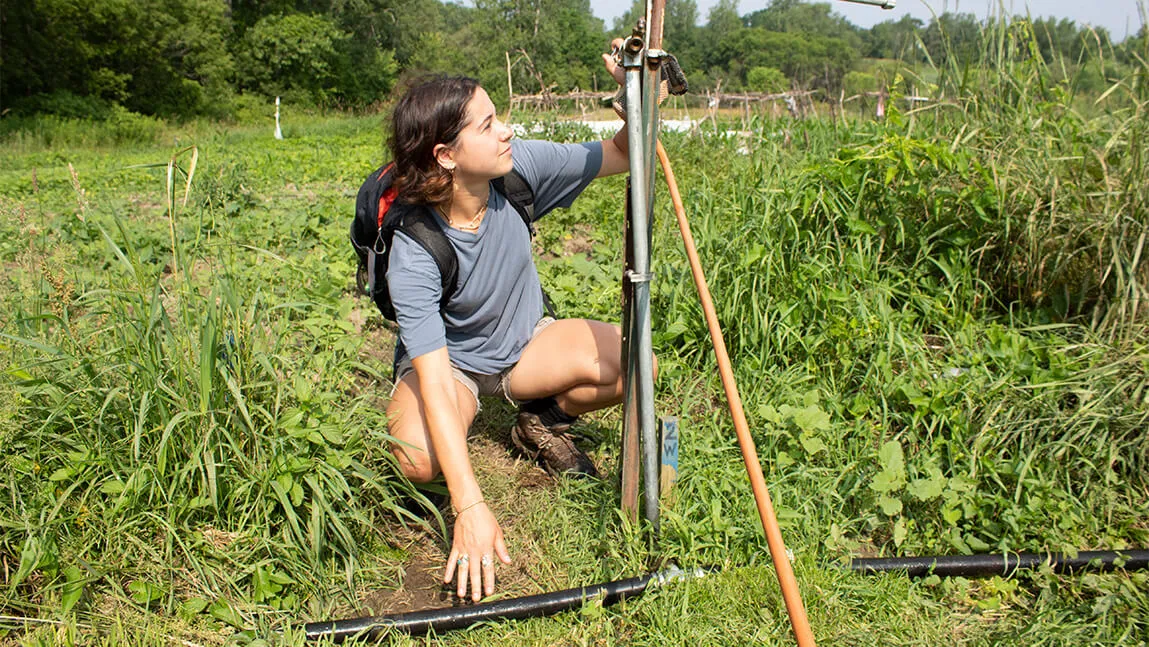Summer is a time for deep dives – and not just the ones at pools or swimming holes. Students from across the University of Vermont, both undergraduates and graduate students, use the summer months to delve into internships and research fellowships that take their studies to a whole new level, and give valuable real-world experience that can help focus future careers.
Read on to see how UVM students this summer helped build better environments, as well as safer, healthier, and more inclusive communities.
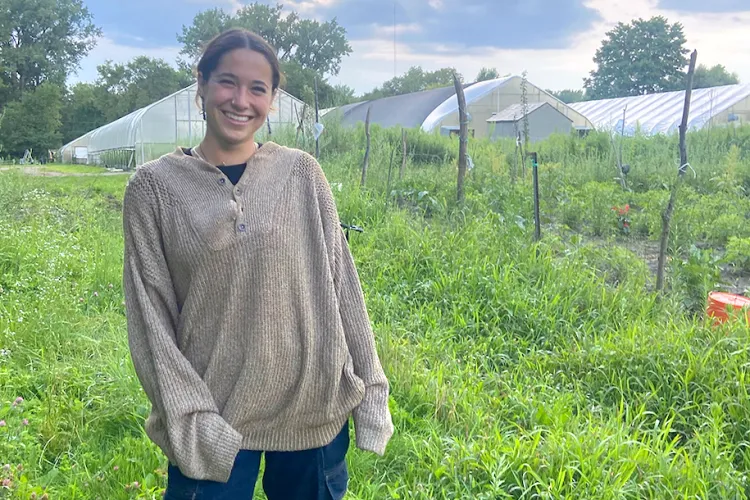
Abra Levin '24 at New Farms for New Americans in Burlington's Intervale, after the July flooding. (Photo courtesy Abra Levin)
Helping Immigrant Farmers Grow—and Recover
When Abra Levin ’24, a Global Studies and Environmental Studies double-major within the College of Arts and Sciences, heard about an internship opportunity with New Farms for New Americans (NFNA) last spring, she had a feeling it would be perfect fit. A community-based garden and agriculture program for refugees and immigrants, NFNA offered a unique way for Levin to combine two areas she’s passionate about. “It’s this really awesome intersection between working with the environment and connecting with people cross-culturally,” she said. She landed the summer position and prepared to split her time between working on the organization’s two Burlington farms and teaching young people about sustainable food systems through AALV, NFNA’s parent organization.
Initially, Levin’s on-site farm work focused on general maintenance, fixing irrigation lines, and assisting the farmers with whatever they needed. She loved being out with them in the gardens, providing support so they could grow crops from their home countries that would feed their families for months after harvest.
Then the flood hit.
“I don’t know how much everyone saved but they tried to get out what they could before the water came,” said Levin, who spent those precious hours harvesting garlic meant to be distributed to the farmers. Soon afterward, both farms and all their bounty and promise disappeared under several feet of the nearby Winooski River. Levin’s scope of work took an abrupt turn toward helping the farmers clean up and determine what crops, if any, were salvageable. She also took over social media for NFNA, interacting with the many people looking for help, needing information, or wanting to donate. “It’s the most traffic we’ve ever had,” she said. “It’s devastating to see the heavy burdens caused by the flooding, but thanks to so much support from individuals and external organizations, there seems to be hope rising within this community.”
As the NFNA community began the long journey to recovery, Levin discovered something of great value amid the wreckage: a calling. “We’ve been working to communicate across cultures and languages about how to deal with these disastrous effects of climate change and the burden it puts on our food system,” she said. She has found great satisfaction in dealing with such issues on a local level and is intrigued by the possibilities and challenges of urban agriculture. “I think there might be a future there for me.” – Reporting by Su Reid-St. John
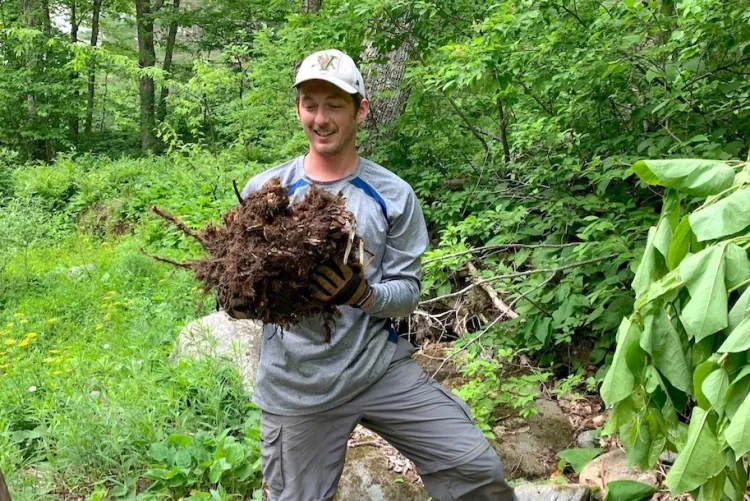
Jack Locker '24 holds a clump of invasive knotweed. (Photo courtesy Jack Locker)
In the Weeds, and Learning
Jack Locker '24 is an Environmental Studies student in the Rubenstein School of Environment and Natural Resources. This summer he interned with the Conservation Commissions of three Vermont towns in the Mad River Valley—Warren, Waitsfield, and Fayston.
He and seven fellow interns from UVM spent the past few months removing Japanese knotweed from natural spaces to slow its spread. Introduced to North America as an ornamental plant in the 19th century, knotweed is now considered one of the most invasive species on the continent, commonly crowding out multiple native species of plants from riverbanks and other areas, which in turn affects insects and animals who depend on the native species for food.
Jack reflected on his internship experience in an article published in the Valley Reporter on August 3, 2023. While he spent the majority of his days doing physical labor in the field, his insights go well beyond the struggles of knotweed root removal and muggy summer weather. Jack dives deep into his motivations for doing conversation work, human-nature relationships, and the ways in which knotweed parallels themes of privilege, colonization, and environmental justice. Read Jack's reflection. – Reporting by Alayna Howard
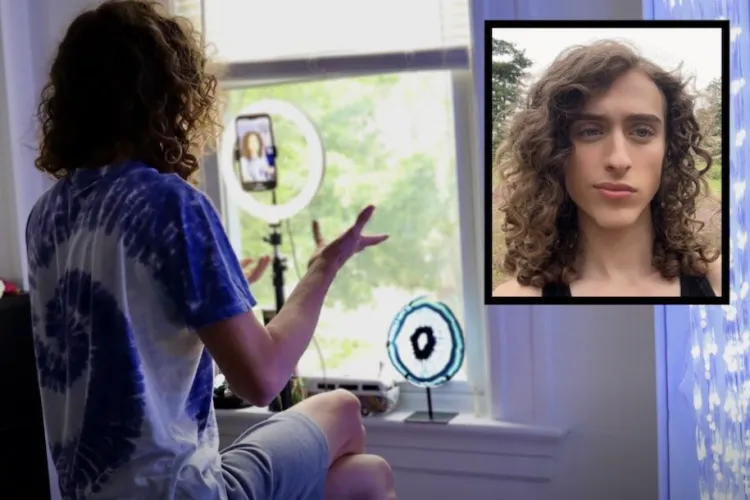
Zane Zupan '25 recording one of their videos for Tik Tok. (Photo courtesy Zane Zupan)
Following a Passion for LGBTQ+ History
You might think a Political Science, Sociology, and Gender, Sexuality, and Women's Studies triple-major who juggled three jobs while carrying a full course load during the past school year would want to take a break over the summer. But downtime was not on agenda this year for Zane Zupan, a rising junior from Manchester, Vt., with a passion for LGBTQ+ history. Instead, having amassed a sizeable TikTok following over the past few years for their thoughtful commentaries on politics and current events, Zupan (who uses the pronouns they/them) applied for and received an award from UVM’s Brennan Summer Research Fellowship Fund to be used for a somewhat unconventional research project.
Called “Making Queer History Accessible to LGBTQ+ Youth During a Period of Targeted Erasure,” Zupan’s project educates viewers about key historical LGBTQ+ events, parsing them into mini history lessons tailor-made for Gen Z. “I designed the project to help make it easier for the younger generations to digest and interact with LGBTQ+ history, which is more important than ever as states across the U.S. actively work to censor this history,” Zupan says. Their goal is to provide young people, especially those in school districts and states in which virtually anything queer-related has been banned or restricted—think books, drag shows, gender-affirming care—with a reliable source of easy-to-digest LGBTQ+ history via TikTok videos. Read more about Zane's summer work here. – Reporting by Su Reid-St. John
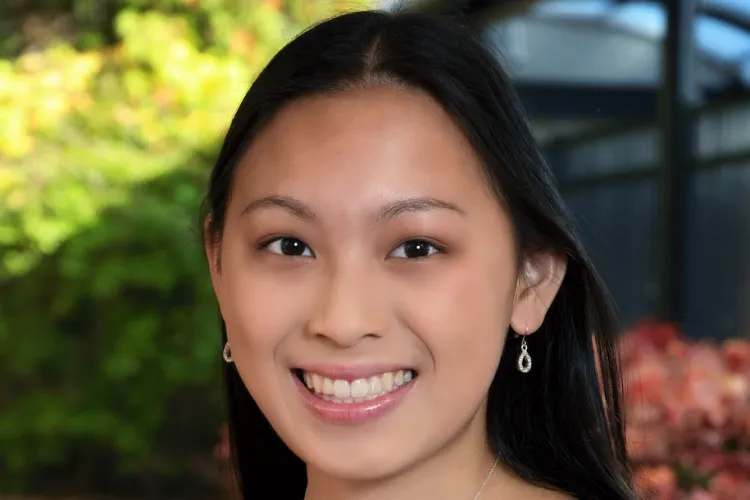
Grossman School of Business student Clara Frothingham '25. (Photo courtesy Clara Frothingham)
Experiencing All Sides of Marketing
Clara Frothingham, a rising junior in the Grossman School of Business, is majoring in Business Administration with a concentration in business analytics, a theme in sustainable business, and a minor in statistics. Clara joined Speed Lemon Media (SLM), a Connecticut boutique agency, in January and was thrilled to continue her growth throughout the summer as a remote marketing and communications intern.
Clara wears many hats in her work and is involved with projects that deal with real estate and podcast host clients. Her responsibilities have included managing editorial calendars, creating marketing content, crafting slide decks for client pitches, conducting in-depth research, running social media accounts, and producing engaging written content for websites and various platforms. This internship has allowed Clara to explore many different facets of the marketing and communications field. – Reporting by Sharon Harper
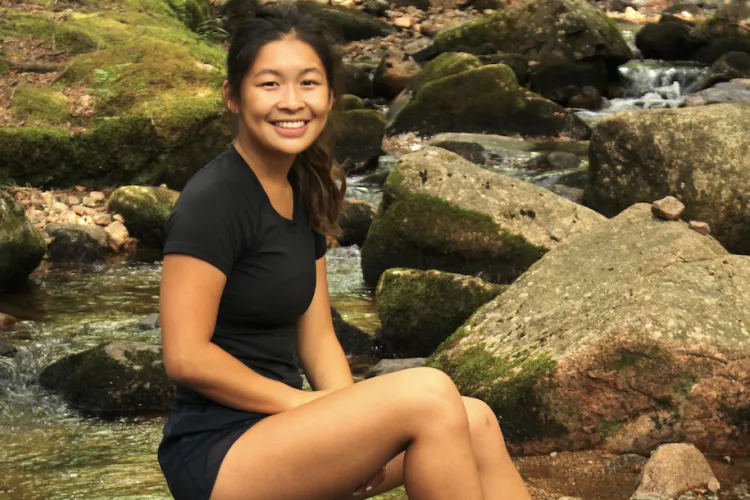
Ella Kenney '25 interned with the Vermont Area Health Education Centers. (Photo courtesy Ella Kenney)
Spreading Firearm Safety Awareness
In Vermont from 2011 to 2022, more individuals passed away from gunshot wounds than car crashes,” said Ella Kenney, Public Health Sciences ’25, of the reason she chose to intern with Vermont Area Health Education Centers (VT AHEC) this summer on a project to promote firearm safety. Working on a team with three graduate students studying medicine and clinical mental health counseling, Kenney researched firearm injury statistics and interviewed healthcare providers to create a pamphlet to facilitate patient-provider conversations about gun safety.
“This project has taught me about the groundwork of quality improvement projects, research, and public health,” said Kenney. The experience also enhanced Kenney's interpersonal and communication skills, essential for public health practice, and her confidence in her ideas.
“Learning about public health is one thing, but being involved in creating change is entirely different,” said Kenney. “By creating and spreading awareness about firearm safety, I hope we can connect Vermonters to necessary support and services so that they make proactive choices to protect themselves and their loved ones.” – Reporting by Sara White
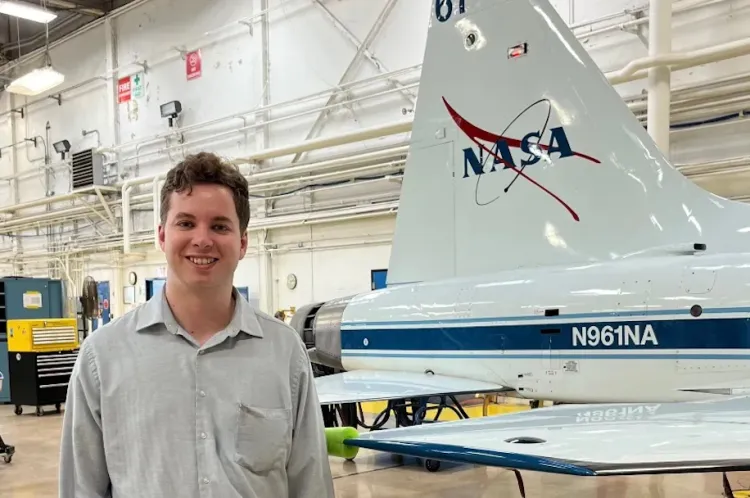
Larner senior medical student Clifford Reilly at the Johnson Space Center in Houston. (Photo courtesy Clifford Reilly)
Reaching High for a Medical Specialty
Clifford Reilly, a fourth-year medical student at the Larner College of Medicine, recently completed an aerospace medicine clerkship experience at National Aeronautics and Space Administration (NASA). In post on the LarnerMed Blog, Reilly explained that, while wrapping up his third year at Larner, a time when medical students begin to focus in on their potential future specialty, the question “do we need doctors in space?” occurred to him. His search for the answer led him to the application page for NASA’s Aerospace Medicine Clerkship. He applied that day.
“Several months later, I found myself standing in front of the Lyndon B. Johnson Space Center in Houston, Texas, full of anticipation,” he writes. “The next four weeks involved a series of aerospace medicine lectures and tours of various NASA facilities, such as the self-explanatory Mission Control Center and the Neutral Buoyancy Laboratory—an intense training pool where astronauts prepare for spacewalks. As part of this incredible experience, I completed a research project examining medical records from the Apollo Program. Delving into the decades-old paper charts, I sought to better understand what medical symptomology the astronauts might have experienced during their famous moonwalks.
“What I learned during my time at NASA was fascinating, to say the least. I realized that, despite the engineering feats we’ve achieved, space can still be incredibly hazardous to one’s health. The lack of gravity takes its toll on the human body—affecting bones, eyes, and other organ systems. Cosmic radiation, if not correctly mitigated, can significantly impact an astronaut’s lifetime cancer risk. Even the mundane becomes complex when one is miles above the surface of the planet: exposure to loud sounds and hygiene concerns (yes, I did attend an entire lecture about the space toilet) are just a few of the unexpected occupational hazards that come with space travel.” – Read Clifford Reilly’s full blog post about his experience here.
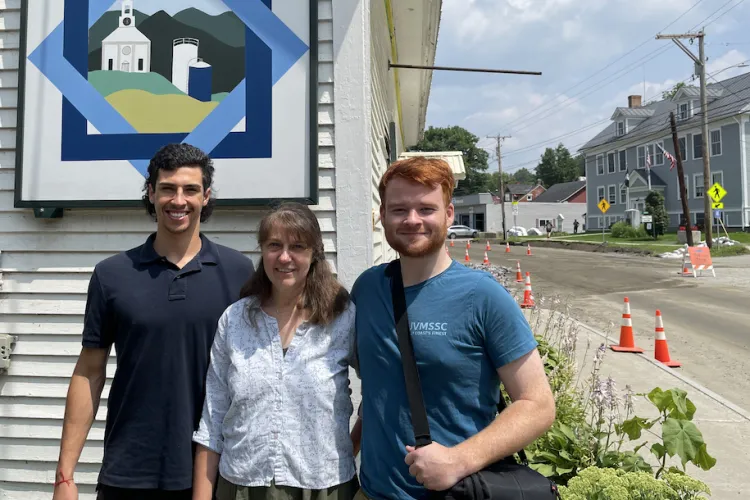
Bryce Hird '23 (at right) with fellow intern Matt Levy '25 and Lori Augustyniak, executive director of the Cabot Community Association, on Cabot's Main Street. (Photo courtesy Bryce Hird)
Pivoting the Story
Bryce Hird graduated this spring as a public communications major in the College of Agriculture and Life Sciences with a minor in psychology. He stayed in Vermont this summer to complete an internship with the Cabot Community Association (CCA). The CCA has a broad mission of working with Cabot residents and organizations to support a lively local economy. Hird had a full plate of media projects planned, including podcasts promoting Cabot’s trail system and writing articles for the Cabot Chronicle, a free online newspaper for Cabot residents.
One of his first stories, aligned with a lecture from a visiting naturalist, highlighted the essential role of pollinators in Vermont’s ecosystem and steps individuals can take protect pollinators like honeybees. It was typical of the stories he thought he’d be telling throughout the summer. But Mother Nature had other ideas. The Winooski River runs through Cabot and many homes and businesses along the town’s Main Street were flooded due to the torrential rains that came in July.
“Lori (supervisor Lori Augustyniak) introduced me to a lot of people in town when we first arrived, so when the floods came, I had already established real connections with the community,” Hird said.
Hird’s stories gave voice to residents and business owners who suffered losses, and investigative pieces on the town’s infrastructure. “We weren’t able to complete the projects we set out to do, but I learned I need to be fluid with my thinking, instead of clinging to a fixed idea of what we were there for,” he said. – Reporting by Kevin Coburn
Are you a current UVM student who has had an internship or other experiential learning opportunity this summer? The UVM Career Center is holding a Summer Snapshot student photo contest. Find out more about rules and prizes here.
